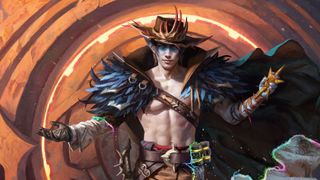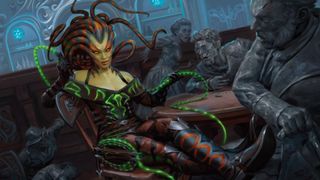Magic: The Gathering's latest set gives you a good excuse to dig out those old cards
Outlaws of Thunder Junction finds new use for old toys.

You'd think a card game with as many expansions as Magic: The Gathering would have done something as poker-adjacent as a Western set before now, but it's taken until its 100th expansion for Magic to cowboy up. Outlaws of Thunder Junction explores a new plane full of arcane trains to rob and cactus-spider monsters to shoot—called cactarantulas, naturally—but it's interesting how much this brand new set's mechanics have made me want to go trawling through older cards.
For starters, there's Crime now. Several cards improve or trigger abilities if you committed a Crime that turn, where Crime is defined as "Targeting an opponent, anything that opponent controls, and/or any cards in an opponent’s graveyard". That covers quite a lot of ways you can mess with other players, but doesn't include basic attacking. When you take a swing at an opponent in the combat phase, you're not targeting anything specific, which I like to imagine as all your creatures marching forward windmilling their arms like Bart Simpson. Nothing criminal about that.











To actually count as committing a Crime, you have to play something that deliberately targets a specific card or opponent. When you do, you're rewarded by cards like At Knifepoint, which gives you a free Mercenary; Rattleback Apothecary, which gives another creature Menace or Lifelink for the turn; and Marauding Sphinx, which lets you Surveil 2. If you've got multiple Crime-triggered cards in play, committing one Crime sets them all off. It's a new mechanic that builds on abilities cards already have.
The other backwards-looking mechanic in Outlaws of Thunder Junction is, well, outlaws. Rather than introducing a new type for this set like "faerie" or "ninja", it's a new batch that bundles existing types together: assassins, mercenaries, rogues, pirates, and warlocks all count as outlaws now. Having some of these scoundrels in play sets off interactions with new cards, just like committing a Crime. The Take the Fall card normally gives a creature -1/0, but that becomes -4/0 if you control even one outlaw. The vampiric Olivia, Opulent Outlaw gives you a free treasure whenever an outlaw causes damage. And the aforementioned At Knifepoint, which hands out free mercenaries when you do Crimes, also gives all your outlaws First Strike.
Outlaws of Thunder Junction looks back in a historical way too, as it sees the return of Desert lands. Dating back to the very first Magic expansion, 1993's Arabian Nights, the basic Desert card gave you the option of tapping it for a point of colorless mana, or to cause a point of damage to an attacking creature. Though the subtype returned and was expanded in sets like the Egyptian-themed Amonkhet in 2017, now there's a bunch of them that can be tapped for colored mana in a choice of two types, and they have evocative names like Soured Springs (for blue or black) and Festering Gulch (for green or black). They can still be tapped to do a point of damage as well, though it's now specifically to a "target opponent". Yes, that means deserts are capable of committing Crimes.

Don't ask me how that would work. I just love the idea of someone getting sunburnt and declaring this against the law, which then somehow causes a Mercenary to emerge, who then gets Menace. It's exactly the kind of thing the Twitter account that draws comics imagining weird Magic card interactions would have a field day with, and I see they've already been inspired by the way a specific older card—in this case the helpful Pheldagriff—can now be used to commit Crimes and profit. It's funny to imagine the card that hands your opponent a free hippo is suddenly some kind of mastermind kingpin, but it's just another example of how this set makes you look back at old cards and find new context to use them in, which makes it a success in my book.
PC Gamer Newsletter
Sign up to get the best content of the week, and great gaming deals, as picked by the editors.

Jody's first computer was a Commodore 64, so he remembers having to use a code wheel to play Pool of Radiance. A former music journalist who interviewed everyone from Giorgio Moroder to Trent Reznor, Jody also co-hosted Australia's first radio show about videogames, Zed Games. He's written for Rock Paper Shotgun, The Big Issue, GamesRadar, Zam, Glixel, Five Out of Ten Magazine, and Playboy.com, whose cheques with the bunny logo made for fun conversations at the bank. Jody's first article for PC Gamer was about the audio of Alien Isolation, published in 2015, and since then he's written about why Silent Hill belongs on PC, why Recettear: An Item Shop's Tale is the best fantasy shopkeeper tycoon game, and how weird Lost Ark can get. Jody edited PC Gamer Indie from 2017 to 2018, and he eventually lived up to his promise to play every Warhammer videogame.